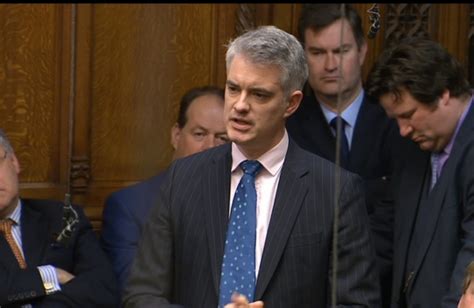The government this evening unveiled new levels of public support for businesses’ energy bills beyond March 30, when the first six-month phase of current support expires.
Treasury minister James Cartlidge, pictured, told the House of Commons that post-March support from government will be extended to twelve months, providing a ‘transitional bridge’ for commercial bill payers.
Support budgeted at up to £5.5 billion for businesses, charities and public organisations will amount to discounts equivalent to up to £6.97 per MWh off retail prices of gas, and £ 19.61 per MWh off electricity costs. All discounts will be applied at source.
The minister presented those prices as saving £2,300 for an average pub over the full 12 months of the new arrangements, and £400 off for a small retail store.
For intensive energy users in manufacturing, higher levels of support will equate to discounts on all but the first 30% of volumes consumed. For gas the unit discount will be up to £40 per MWh, and £89.10 per MWh for electricity.
An average manufacturing firm would save around £700,000 over the twelve months of the second phase, the minister said.
Such firms would continue to supported at source on the basis of average wholesale costs of 99 MWh for gas and £118 MWh for electricity.
Extending the second phase of support until April 2024 would give greater predictability & security than the phase it replaced, Cartlidge asserted. Phase 2 ‘s budgeted £5.5 billion compares with the £18 billion confirmed by the Office of Budget Responsibility to have been met from public funds since October.
Short-lived energy secretary Jacob Rees-Mogg introduced his energy bill relief scheme in September, mimicking the energy price guarantee aiding domestic users.
Cartlidge this evening commended the government’s support for business energy as among the most generous in Europe. But it could not continue at current levels, in view of national debt standing now at £2.48 trillion, equivalent to 98.4% of GDP.,
Taxpayer exposure to volatile energy markets needed to be capped, said the minister. But the government was aware that businesses needed long-term horizons, including incentives to invest in energy efficiency. Continuing Government support contains an additional £ 6 billion of publicly funded measures intended to cut energy use, Cartlidge said.
Wholesale gas prices, the cause of turmoil in the setting of UK electricity generation tariffs as well as for direct end users, have in recent weeks dropped significantly below levels posted before Russia’s invasion of Ukraine, begun on 24 February. This morning spot prices on the EU Dutch TTF market were around Euros 75 per MWh, marginally lower than prices last seen in the week before Vladimir Putin’s assault on Ukraine, and halved in only 30 days since early December.
Freakishly warm weather across northern & central Europe, allied to co-ordinated stock building, and accelerated mitigation such as Germany’s completion of a new floating LNG terminal at Wilhelmshaven, are among factors depressing gas prices.
Complicating Whitehall’s targeting of emergency support during the first phase has been brokers’ and suppliers’ frequent ignorance of the industrial sectors in which their customers operate.
In the chamber, Labour’s treasury spokesperson Abena Oppong-Asare asked whether the three monthly review among stakeholders had ever taken place in December, promised by by Rees-Mogg.
Her colleague Darren Jones, chair of the Commons’ backbench industry and energy select committee pressed that ministers should correct business energy support measures, as they had done with schemes support domestic bill-payers.
Scots Nationalist MP Joanna Cherry cited the example of a city farm charity in her Edinburgh constituency which faced likely closure after a 300% rise in its energy costs.
More details here.




